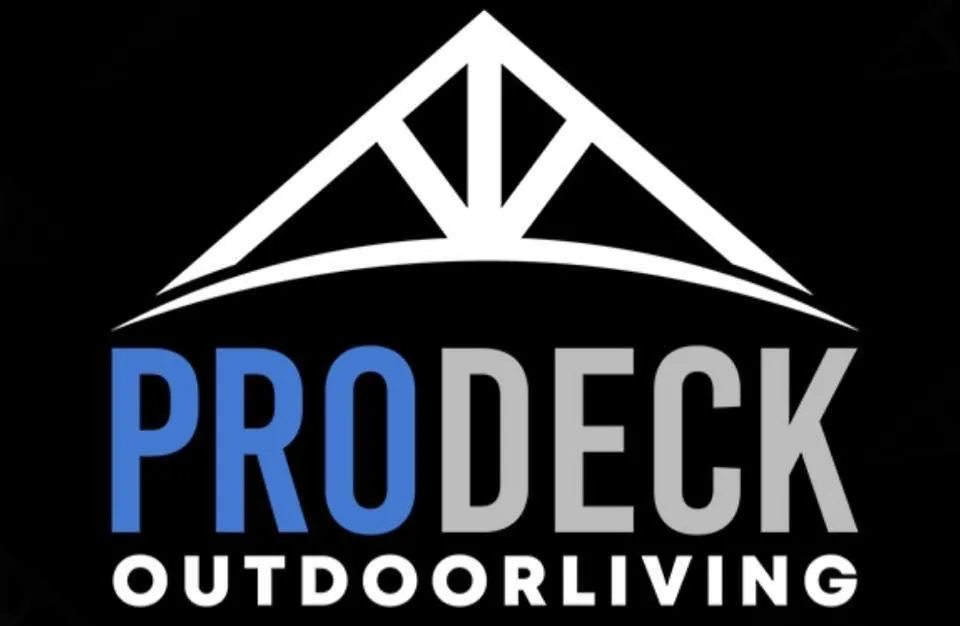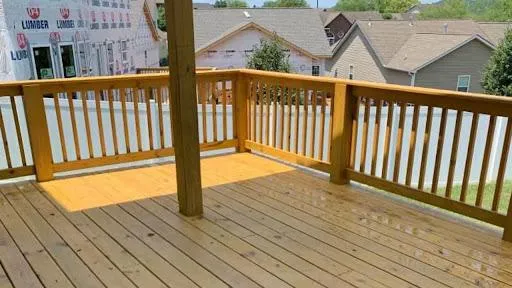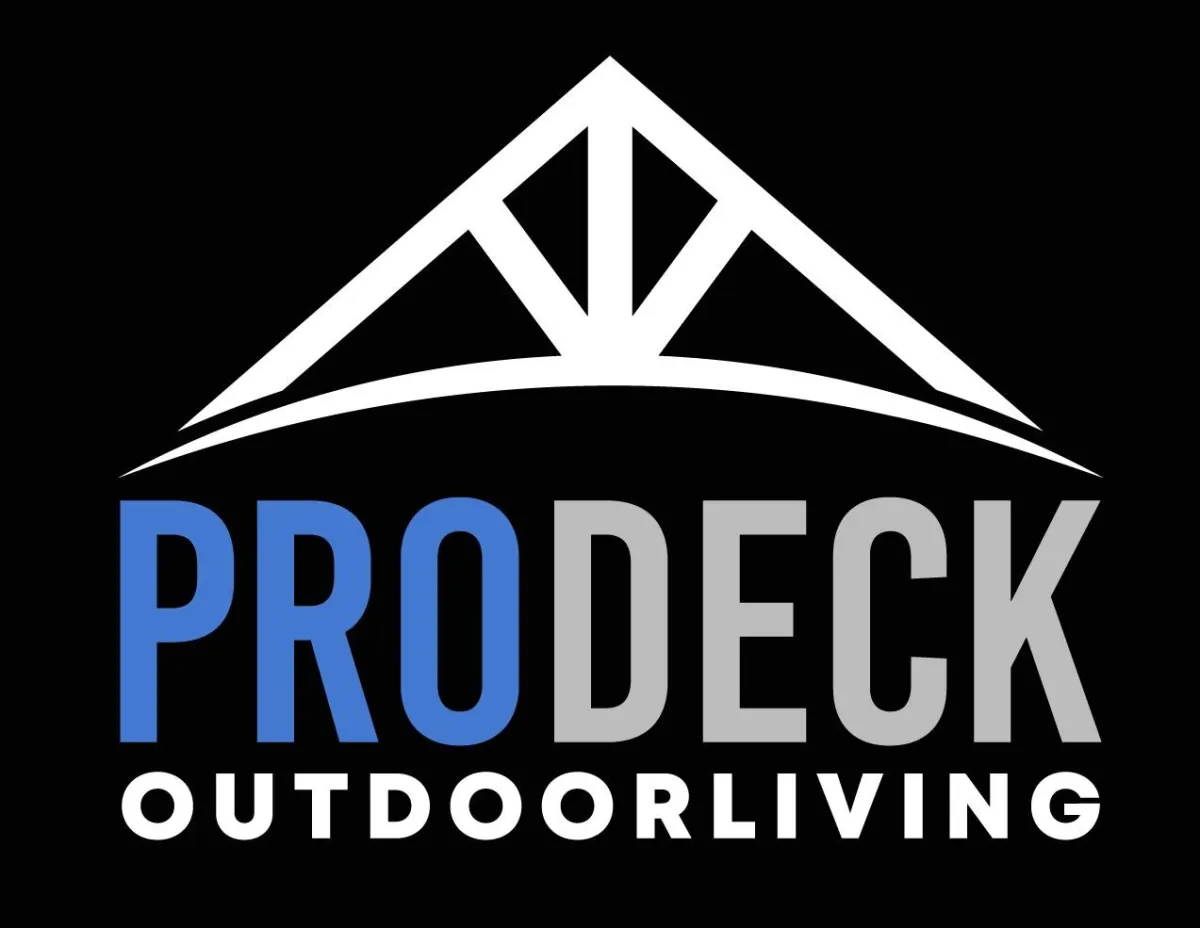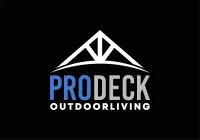
Knoxville's #1 Deck & Patio cover solutions
Blog

What Are The Pros And Cons Of Different Deck Materials?
Wood decks provide natural beauty and ease of repair but need regular maintenance and are prone to rot, while composite decks are durable and low-maintenance but can be expensive and less natural in appearance; vinyl decks offer low maintenance and resistance to moisture but may fade and have a higher cost, and aluminum decks are long-lasting and rust-resistant but are costly and lack the warm look of wood.
When it comes to enhancing your outdoor living space, choosing the right deck material is crucial. The deck not only serves as a functional space for entertaining and relaxation but also adds significant aesthetic value to your home. With various options available, from traditional wood to modern composites and metals, each material has its own set of advantages and disadvantages.
In this guide, we’ll explore the pros and cons of popular deck materials to help you make an informed decision for your next project. Whether you're looking for a classic wooden deck or a low-maintenance composite, ProDeck Outdoor Living, the premier deck builder in Knoxville, Tennessee, is here to help you transform your vision into reality with unparalleled craftsmanship and customer satisfaction.
Key Takeaways
Wood Decking: Offers natural beauty at a lower initial cost but requires regular maintenance and has a shorter lifespan.
Composite Decking: Known for its durability and low maintenance needs, though it comes with a higher initial cost and potential for scratching.
Tropical Hardwood Decking: Provides extreme durability and natural resistance to rot but is harder to work with and less available.
Aluminum Decking: Extremely long-lasting and low-maintenance but more expensive and limited in color options.
Deck Material Comparisons
Wood Decking
Wood decking has been a popular choice for decades due to its natural charm and affordability. It's a classic option that provides warmth and character to any outdoor space.
Pros of Wood Decking:
Natural Aesthetic Appeal: The timeless beauty of wood can enhance the visual appeal of your deck.
Lower Initial Cost: Generally cheaper than composite and tropical hardwood options.
Refinish and Stain: Wood can be easily stained or refinished to update its look.
Cons of Wood Decking:
Regular Maintenance Required: Wood decks need frequent staining, sealing, and cleaning to maintain their appearance and longevity.
Prone to Damage: Without proper maintenance, wood can suffer from rot, decay, warping, and insect damage.
Shorter Lifespan: Compared to composites and metals, wood decks typically have a shorter lifespan.
Composite Decking
Composite decking has gained popularity in recent years due to its durability and low maintenance requirements. Made from a mix of wood fibers and plastic, it offers a modern alternative to traditional wood.
Pros of Composite Decking
High Durability: Resistant to rot, decay, and insect damage, making it a low-maintenance option.
Variety of Options: Available in numerous colors, finishes, and grain patterns.
Low Maintenance: Requires only periodic cleaning to keep it looking its best.
Cons of Composite Decking
Higher Initial Cost: Typically more expensive than wood decking.
Prone to Scratching and Fading: Can scratch and fade over time, especially with heavy use.
Variable Quality: Performance can differ significantly between brands.
Tropical Hardwood Decking
Tropical hardwoods, such as Ipe and Teak, are renowned for their stunning natural appearance and exceptional durability. They are a premium choice for those seeking a high-end look.
Pros of Tropical Hardwood Decking
Natural Beauty: Offers an exquisite and unique appearance.
Extremely Durable: Known for its hardness and resistance to rot and insects.
Low Maintenance: Generally requires less upkeep compared to wood.
Cons of Tropical Hardwood Decking
Limited Availability: Not as widely available as other materials.
Installation Difficulty: Harder to cut, install, and stain due to its density.
Fades Without Stain: Will lose its rich color if not regularly stained.
Aluminum Decking
Aluminum decking is a relatively new entrant to the decking market, offering an extremely durable and low-maintenance option. Its modern look and performance make it a choice for those seeking longevity.
Pros of Aluminum Decking
Durable and Long-Lasting: Resists fire, rot, and insect damage, and has a long lifespan.
Minimal Maintenance: Requires very little upkeep beyond occasional cleaning.
Fire Resistant: Safe in areas prone to wildfires.
Cons of Aluminum Decking
Higher Cost: More expensive than wood and composite options.
Slippery When Wet: Can be slippery, especially in rainy conditions.
Limited Color Options: Fewer choices for customization compared to other materials.
How to Choose the Right Deck Material for Your Home
Selecting the perfect deck material for your home involves more than just considering aesthetics; it's a multifaceted decision that requires a deep dive into your lifestyle, budget, and maintenance preferences. Understanding the various options available—such as wood, composite, tropical hardwood, and aluminum—can help you make an informed choice that aligns with your specific needs. Each material comes with its own set of advantages and drawbacks that must be weighed against your intended use, climate considerations, and long-term maintenance expectations.
Key Factors to Consider:
Cost: Evaluate the initial expense and long-term value of each material.
Maintenance: Consider the upkeep requirements for each type.
Durability: Assess how each material withstands weather and wear.
Aesthetics: Choose a style and finish that complements your home.
Climate: Select a material suited to your local weather conditions.
Maintaining Your Deck: Tips for Longevity
Proper maintenance is crucial for preserving the beauty and functionality of your deck over time. Each decking material—whether wood, composite, tropical hardwood, or aluminum—requires specific care to ensure longevity and performance. Regular upkeep can prevent common issues like fading, staining, and structural damage, helping you enjoy your outdoor space for years to come. Understanding the unique maintenance needs of your chosen deck material allows you to implement best practices and extend the life of your investment.
Maintenance Tips:
Wood Decks: Regularly stain and seal to prevent rot and damage.
Composite Decks: Clean periodically to remove dirt and debris.
Tropical Hardwoods: Apply stain to maintain color and prevent fading.
Aluminum Decks: Minimal maintenance required, mostly cleaning.
Design Ideas for Decks That Enhance Your Outdoor Space
A well-designed deck can significantly enhance your backyard, transforming it into a versatile and inviting outdoor area. Incorporating creative design elements can maximize your deck's functionality and aesthetic appeal. Whether you prefer a sleek modern look or a cozy, rustic feel, there are numerous ways to customize your deck to fit your personal style and lifestyle needs. Thoughtful design choices can turn your deck into a focal point of your outdoor living space, making it both beautiful and functional.
Design Ideas:
Built-In Seating: Add benches or loungers for extra comfort and space.
Lighting: Install ambient or task lighting to enhance usability at night.
Landscaping: Integrate planters or garden beds for a natural touch.
Decking Patterns: Use different patterns or colors for visual interest.
Outdoor Kitchen: Include a grill or countertop for entertaining.
Comparing Deck Building Costs: What to Expect
Understanding the costs associated with different deck materials is essential for effective budgeting. Beyond the initial material cost, consider long-term maintenance and potential repairs to fully assess the financial impact of your deck project. Comparing the overall value and expense of wood, composite, tropical hardwood, and aluminum will help you make a sound financial decision that aligns with your budget and project goals.
Cost Considerations:
Wood Decks: Lower initial cost but higher maintenance expenses.
Composite Decks: Higher upfront cost with lower maintenance needs.
Tropical Hardwoods: Premium price with minimal upkeep.
Aluminum Decks: Most expensive with very low maintenance.
Eco-Friendly Decking Options: Sustainable Choices for Your Home
As environmental awareness increases, selecting eco-friendly decking materials has become more important. Sustainable options can provide durability and style while minimizing environmental impact. Materials made from recycled content or responsibly sourced wood offer a greener choice without compromising quality. By opting for eco-friendly decking, you contribute to environmental conservation while enjoying a beautiful and functional outdoor space.
Sustainable Options:
Recycled Composite Decking: Made from recycled plastics and wood fibers.
Sustainable Hardwood: Certified by organizations like FSC for responsible sourcing.
Bamboo Decking: A fast-growing, renewable resource with high durability.
Reclaimed Wood: Utilizes repurposed materials for an eco-friendly option.
FAQs
What is the most cost-effective deck material?
Wood decking typically has the lowest initial cost compared to composite, tropical hardwood, and aluminum.
How often does wood decking need maintenance?
Wood decks require regular maintenance, including staining and sealing, usually every 1-3 years depending on exposure and wear.
Is composite decking really low maintenance?
Yes, composite decking requires minimal maintenance, usually just periodic cleaning, as it does not need staining or sealing.
What are the main benefits of aluminum decking?
Aluminum decking is extremely durable, requires little maintenance, and is resistant to fire, rot, and insects.
Can tropical hardwood decking be stained or sealed?
Yes, tropical hardwoods can be stained and sealed to maintain their appearance and protect against fading.
Choose ProDeck Outdoor Living for Your Deck Project
When selecting the right deck material for your home, it's essential to weigh the pros and cons of each option based on your needs and preferences. Whether you opt for the classic charm of wood, the durability of composite, the luxury of tropical hardwood, or the resilience of aluminum, ProDeck Outdoor Living in Knoxville, Tennessee, is here to guide you every step of the way.
Contact us now at ProDeck Outdoor Living, your premier deck builder in Knoxville, Tennessee, for a free quote! Don’t wait—reach out now to start your deck transformation and experience the ProDeck difference. Call us today and let’s make your dream deck a reality!
BLOG
Why We Care About Our Clients at ProDeck Outdoor Living
At ProDeck Outdoor Living, our passion goes beyond building beautiful outdoor spaces. We care deeply about our clients because we believe that a home’s outdoor area should be more than just a deck or patio—it should be a space where memories are made, laughter is shared, and moments of peace and relaxation are enjoyed. Our commitment to excellence is rooted in our dedication to the people we serve.
Our Why: Creating Meaningful Outdoor Spaces
We do what we do because we understand the value of outdoor living. Whether it’s a backyard deck where a family gathers for summer barbecues, a pergola that provides shade for afternoon reading, or a custom patio that serves as the heart of celebrations, we take pride in transforming outdoor areas into places of comfort and connection. Our goal is to design and build spaces that enhance our clients’ lifestyles and bring their visions to life.
Building More Than Just Structures
To us, every project is personal. We take the time to listen to our clients, understand their needs, and collaborate closely to bring their dreams to reality. Every detail matters because we know that a well-crafted outdoor space can add joy and value to a home. Our team’s dedication to quality craftsmanship and customer satisfaction is what sets us apart. We treat every project as if it were for our own home, ensuring that we deliver not just a deck or patio, but an experience that exceeds expectations.
A Commitment to Trust and Transparency
Trust is at the core of what we do. From the initial consultation to the final touches, we believe in clear communication, honesty, and reliability. Our clients trust us to bring their outdoor visions to life, and we take that responsibility seriously. That’s why we work with high-quality materials, skilled professionals, and a customer-first approach to ensure that every project is completed with precision and care.
Why We Care
At the heart of our work is a genuine passion for improving lives through outdoor living. We care about our clients because we believe in the power of well-designed spaces to create happiness, relaxation, and unforgettable moments. Seeing the joy on a client’s face when they step onto their new deck or patio for the first time is why we do what we do.
Thank you for trusting ProDeck Outdoor Living to bring your outdoor dreams to life. We’re
honored to be a part of your journey in creating spaces that truly feel like home.
THE BEST IN OUTDOOR LIVING & CONSTRUCTION
Request An Estimate To Get Started Today!
Copyright © ProDeck Outdoor Living. 2025. All Rights Reserved. Privacy Policy. Terms & Conditions. Web Design by Fused Media


